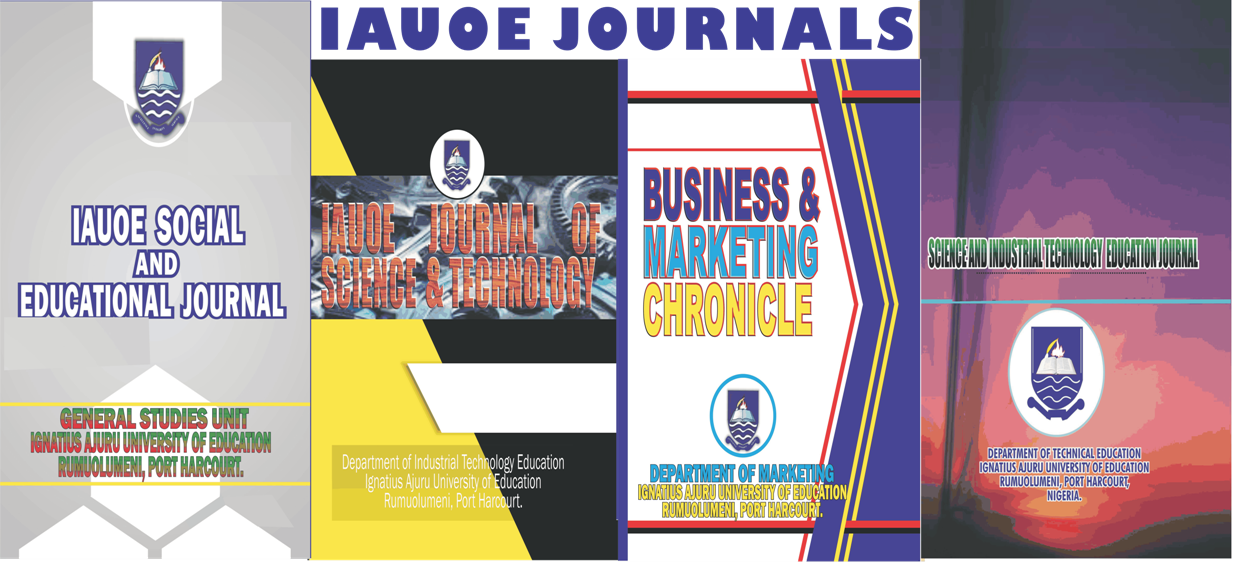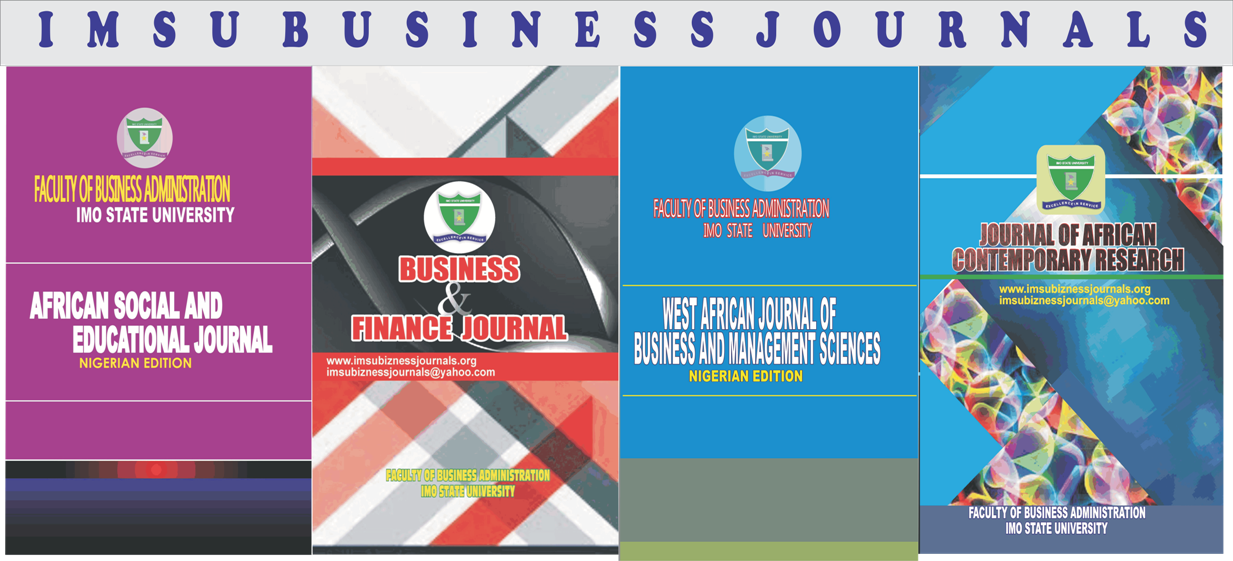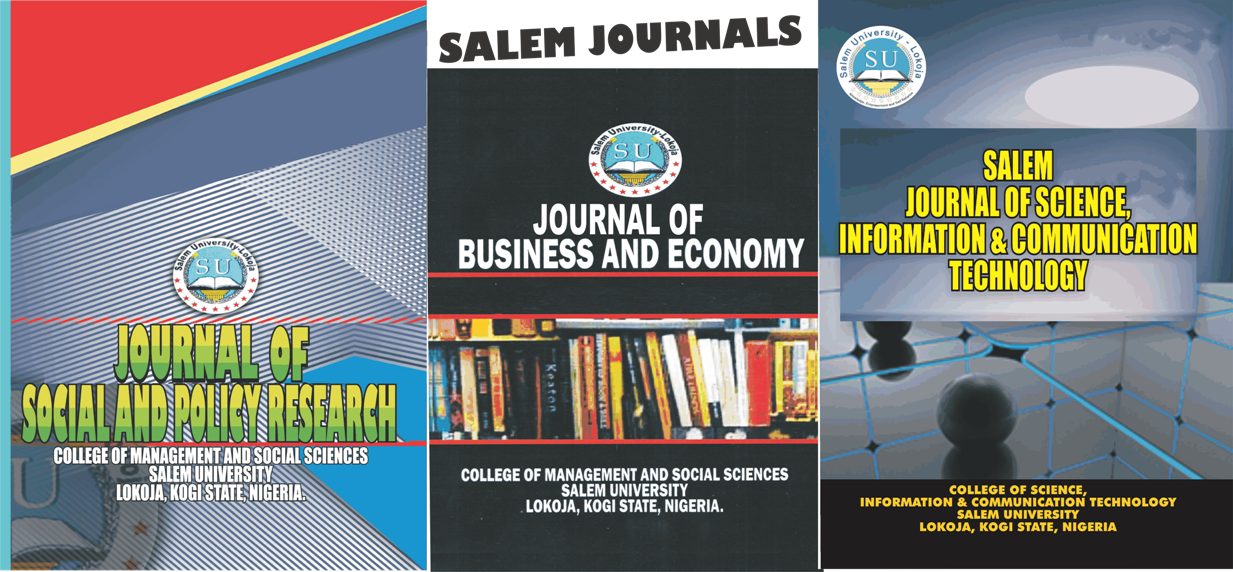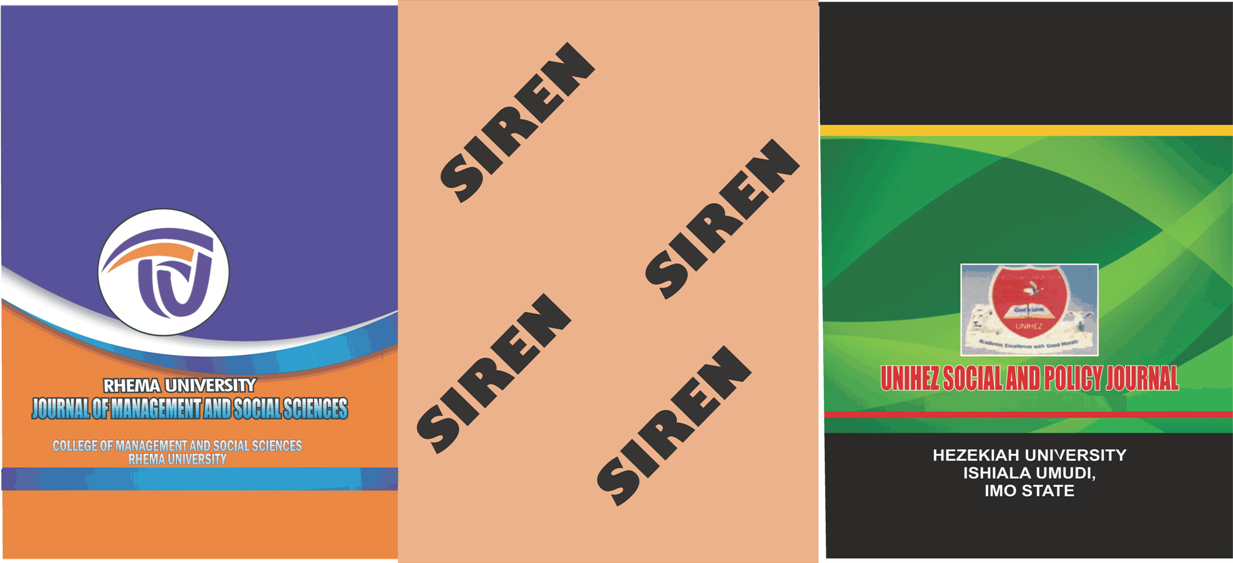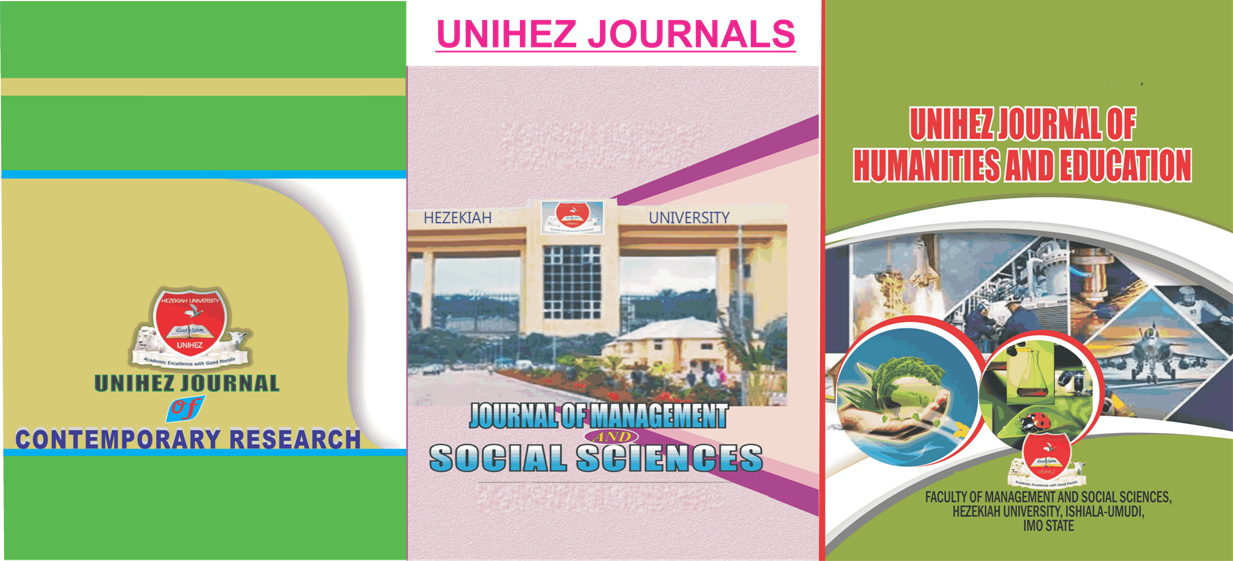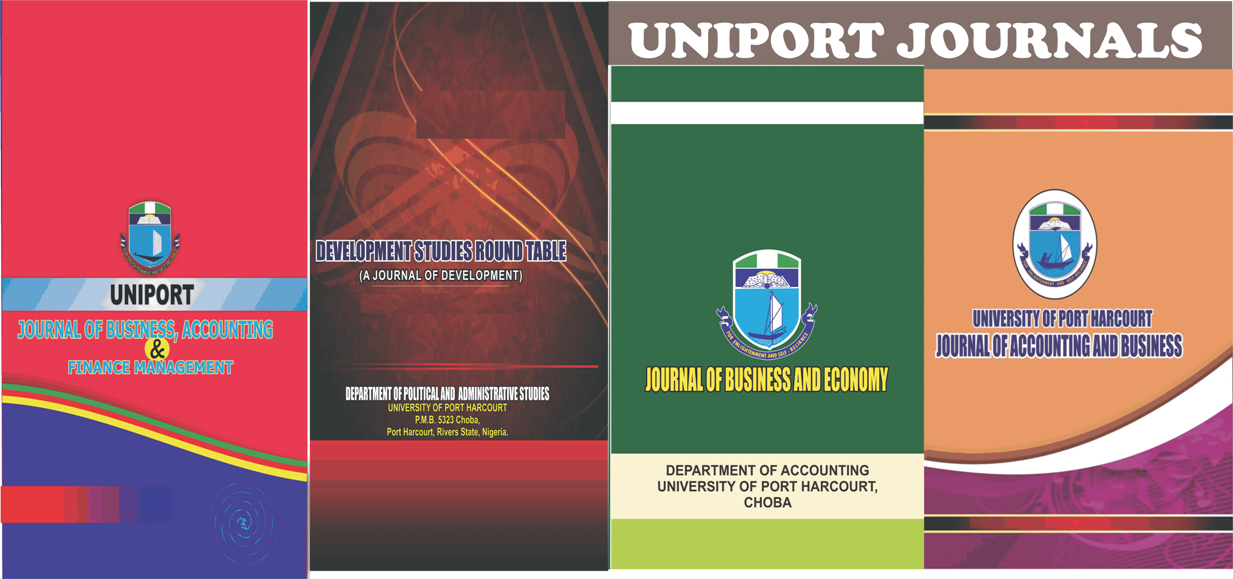2021 Archive
| 1 |
Title: PUBLIC CAPITAL INVESTMENTS AND NIGERIA’S CONOMY AN ERROR ORRECTION MODEL APPROACH.pdf Author: Samuel L. Penu., Barisua F. Nwinee & Ikechukwu S. Nnamdi Abstract: Abstract Motivated by the need to evaluate the prevailing interrelationships between disaggregated elements of government capital investments and Nigeria’s economic growth, this study covered the period 1981 to 2019. It employed time series secondary data obtained from Central Bank of Nigeria’s Statistical Bulletin. Stationarity/unit root, cointegration, lag-length selection criteria and error correction tests were employed. The findings revealed that government capital investment in education is the most valuable factor in explaining Nigeria’s economic growth along with government’s capital investment on construction and transport/communication. Others failed the significance test. In light of the findings, the study recommends that; (i) Government should increase investments in education for the enhancement of human capital development for overall economic growth in Nigeria. (ii) There should be strict budgetary control and financial discipline to ensure that the funds provided are properly chanelled to projects and implemented wholly. (iii) Proper monitoring of the projects by the supervising agencies to safeguard these investments against abandonment and (iv) A national plan for agricultural development should be set up by the government as agriculture have potentials in generating huge employment for the country’s economic growth. Key Words: Human Capital, Material capital, Economic Growth, Expenditure, Investment. View |
| 2 |
Title: DEFECTIVE BILATERAL RELATIONS ANDT HE CHALLENGES OF MULTINATIONAL JOINT TASK FORCE IN WEST AFRICA.pdf Author: Adetayo Olamide Sowale & Olanike Foluso Orogun Abstract: Abstract The study examines issues and challenges of security community with a particular focus on the Multinational Joint Task Forces (MJTF) in combating Book Haram insurgency in West Africa. The choice to examine these armed forces against Boko Haram is significant for a number of reasons. One, the threat of Boko Haram insurgency in West Africa emanates from the inherited irregular and poorly delineated colonial borders. Two, armed forces are deployed to safeguard the territorial integrity and national borders of the affected countries against external aggression. Third, issues of Boko Haram insurgency prominently features in the bilateral relations of Nigeria and its neighbouring states. Fourth, the government of Nigeria, Niger, Cameroon, and Chad established MNJTF as a form of collective security architecture against Boko Haram insurgency. Despite the establishment of MJTF, Boko Haram continues to wreck devastations in the Northeast Nigeria and other neighbouring states. Utilising secondary sources of data, the study concludes defective bilateral relations of Lake Chad Basin Commission (LCBCs) countries adversely affect the functionality of MNJTF. It is therefore recommended that Lake Chad Basin Countries (LCBCs) need to correct the problems associating with bilateral relations in order to successfully combat Boko haram menace in the West Africa sub-region. Keywords: Security, Collective, Bilateral Relations, Multinational Joint Task Force. View |
| 3 |
Title: ACCOUNTING RATIO DETERMINANTS OF SHAREHOLDERS’ INVESTMENT DECISION; EVIDENCE FROML ISTED COMMERCIAL BANKS IN NIGERIA.pdf Author: Uzodimma Amara C. & Chikwelu Emenike E. Abstract: Abstract The aim of this study is to explore accounting ratio determinants of shareholders’ investment decision of twelve (12) commercial quoted banks in Nigeria for the period 2010 to 2018. Financial ratios which were included in this study are earnings per share and cash ratio which also represented the independent variables. Dividend yield (a proxy for shareholders’ investment decision) as seen in prior related literature is employed as the dependent variable. Ex-post facto and descriptive research design were both considered in the study methodology. Specifically, we employed Ordinary Least Square Regression analyses technique to test the study hypotheses which clearly suggest that both ratios of earnings per share and cash ratio are strong and significant indicator necessary to drive shareholders’ investment decision. This finding is consistent with the Dividend Relevance Theory of Lintner & Gordon who argued that shareholders are most interested in current dividend payment than retained earnings. Therefore, in line with the findings obtained, this study recommends that managers should pay special attention towards the payment of dividend especially if the intent is to signal its prospective and existing investors/shareholders. This will most certainly drive up per share earnings ultimately providing good signal to shareholders’ that’s willingness to invest may become stronger. View |
| 4 |
Title: INTERROGATING INHIBITIONS TO HUMAN RIGHTS IN NIGERIA WITHIN THE FRAMEWORK OF CULTURAL, MORAL AND RELIGIOUS VALUES IN AFRICAN JURISPRUDENCE.pdf Author: JOSHUA IGONOH PhD. Abstract: Abstract One core principle of jurisprudence with phenomenal support over the years amongst legal scholars, including human right lawyers is that society and law ought to inter-relate in their functions, to ensure social relations of law rather than its metaphysics or formal logic. Although the poor development of human rights over the years is traceable to several causes but its evolution to issues that challenge some well entrenched values that form the thrust of African philosophy of law appears to be responsible for apathy towards human rights, in its universal outlook in recent times. Using cultural, moral and religious values in African society as benchmark, this paper found that unwieldy evolution of human rights beyond the original text in 1948 to issues that trample upon well entrenched core values of the society may never attract adequate sympathy for enforcement in a culture-centred society as exist in Nigeria. The paper thus recommended that enforcement of human rights be relativised to reflect core-values of each people if the lofty dreams of the founding fathers of universal human right must attract societal sympathy. Key Concepts: Culture, Morality, Religion, Human Right, and African Jurisprudence. View |
| 5 |
Title: GOVERNMENT CAPITAL INVESTMENTS AND NIGERIA’S ECONOMIC GROWTH A GRANGER CAUSALITY APPROACH.pdf Author: Samuel L. Penu., Barisua F. Nwinee & Ikechukwu S. Nnamdi Abstract: Abstract This study examined the prevailing causal interrelationships between disaggregated elements of government capital investments and Nigeria’s economic growth. The study covered the period 1981 to 2019. It employed time series secondary data obtained from Central Bank of Nigeria’s Statistical Bulletin. Stationarity and granger causality tests were employed. The findings revealed prevalence of unidirectional causalities between Nigeria’s gross domestic product and each of government’s capital investments in education, other social and community services, agriculture, construction and other economic services. In all cases, causality flows from Nigeria’s gross domestic product to government capital investments in education, other social and community services, agriculture, construction and other economic activities. Further, bi-directional causality prevails between Nigeria’s gross domestic product and government’s capital investment in transport. In addition, these results revealed the absence of causality between Nigeria’s gross domestic product and government capital investments in health, as they seem to operate independent of each other. The public investment in health failed to promote Nigeria’s economic growth and vice-versa. Unidirectional causalities prevail between Nigeria’s gross domestic product and each of government’s capital investments in education, other social and community services, agriculture, construction and other economic services. In all of these cases, causalities flow from gross domestic product to each of public capital investment in education, other social services, agriculture, construction and other economic services, affirming that as the economic grows, activities in each of these sectors are promoted, reinforced and invigorated. Further, prevalence of bi-directional causality exists between Nigeria’s GDP and investment by government in transportation/communication. However, no causality was found between capital investment on health and gross domestic product. In the light of the results, the study recommends that: (i). The government should increase capital investments in education for enhanced human capital development to promote economic growth. (ii). More funds should be channelled to construction as well as agricultural development as it shows potentials to generate massive employment in the country. (iii). The government should step up in health sector budget. (iv). Proper project monitoring by the executive to safeguard this huge investments and avoid project abandonment. Key Words: Human Capital, Material capital, Economic Growth, Expenditure, Investment View |
| 6 |
Title: INFLUENCE OF FURNISHING IN DRIVING UP CONSUMER BASED BRAND EQUITY IN HOTEL OPERATIONS IN UMUAHIA, ABIA STATE..pdf Author: I.B Anyanwu PhD. & Okpalaeke, V.C Abstract: Abstract This study examined the influence of furnishing in driving up consumer based brand equity in hotel operations in Umuahia, Abia State. It was a survey research and four research hypotheses guided the study. The study population included consumers of goods and services of registered hotels in Umuahia metropolis. It was an infinite population and the sample size was determined using Cochran (1977) formular, which gave 246. Data was generated using structured questionnaire on a four-point scale, and was analysed by running regression analysis on SPSS version 25. Findings revealed that furnishing has positive and significant influence on consumer based brand equity in hotel operations in the study area. It was concluded based on the findings that furnishing can drive up consumer based brand equity in hotel operations. The researchers recommended among others that managers should install attractive and customer-oriented furnishing to improve the level of awareness and differentiate a brand from others, while customers’ comfort and safety should be a top consideration when furnishing to build brand association. Key words: Furnishing, Consumer, Brand Equity, Hotel Operations. View |
| 7 |
Title: CORPORATE TAXATION AND FINANCIAL PERFORMANCE OF DEPOSIT MONEY BANKS IN NIGERIA A DYNAMIC FIXED EFFECTS APPROACH.pdf Author: Ebere Chukwuma Christopher & Kelechi-Nnaji, Njideka Nnenna Abstract: Abstract Motivated by the conflicting results reported by previous studies, this study investigated the impact of corporate taxation on bank financial performance in Nigeria using the dynamic fixed effects framework. Corporate taxation is proxied by corporate income tax, while bank financial performance is measured by earnings per share. The study is based on balanced panel data consisting of 10 quoted deposit money banks in the Nigerian stock exchange from 2010 to 2019. The banks are ACCESS, FIDELITY, GTB, FCMB, FIRST BANK, UBA, UNION BANK, STANBIC IBTC, ZENITH and STERLING BANK. Our dynamic fixed effects model is formally validated by the Hausman test, which shows that unobserved bank-specific factors (such as management quality and leadership style) have a significant correlation with corporate tax practices. Consistent with the stakeholder theory, our results show that corporate taxation is value-enhancing as it leads to higher profitability. However, bank profitability is also found to be persistent and depends on its own one period lagged value. These results are robust as incorporating bank size do not significantly affect the relationship between corporate taxation and bank profitability. Hence, we conclude that corporate taxation is a significant determinant of bank financial performance in Nigeria. Key words: Corporate taxation, bank profitability, dynamic fixed effects model. View |
| 8 |
Title: RESOLVING NIGERIA’S ECONOMIC RECESSION THROUGH TECHNOLOGY AND PROPER MANAGEMENT OF ENVIRONMENTAL RESOURCES.pdf Author: Naabura, Macwilliam Kingdom, Aselemi, Akeuloghonaan Ernest & Needam, Yiinu Barisua Abstract: Abstract This study examines the strength of technology and environmental resources for economic growth in recession period. The aim is to ascertain the possibility of using technology and the natural endowment in solving the problem. Because Nigerian economy which is in recession has been observed to affect her citizens intensively. The data for the study were collected through the primary and secondary sources. The questionnaire was administered to three sets of respondents (Professionals Civil Servants and Industrialists). The data retrieved from the field were analyzed using tables and percentages; the hypothesis was tested using chi-square method of data analysis. The findings show that there is a significant relationship between technology and environmental resources in solving economic recession; also, the study recommends that there should be diversification of the economy to enhance stability or even increase the capital base of the Nigerian economy. Keywords: Technology, Environmental Resources, Economic Recession. View |
| 9 |
Title: SOCIAL NETWORKING COLLABORATION AND EFFECTIVE JOB PERFORMANCE IN RIVERS STATE CIVIL SERVICE..pdf Author: Nwoka, Iyeumame Bethy, Prof. Stephen Okodudu & Dr. Hyacinth G. Worlu. Abstract: Abstract Over the year social networking relevance in organizational concerns had been given sparse scholarly attention. The current trend of social networking collaboration in Nigeria is also comparatively minimal. Several empirical works on social networking collaboration have shown and justified the fact. This conspicuous gap in literature appears keener on work performance in the Civil service. In the light of the fore going, this study examines the relationship between social networking collaboration and effective job performance in the Rivers State Civil Service. The survey design was used in this research work. The target population was 1402 while the sample size was 311 using the Taro Yamene’s sampling technique. The data was collected mainly through questionnaires and in depth interviews and analyzed using the SPPS version 23.The findings indicates that there is a positive significant relationship between social networking and effective job performance in Rivers state civil service. There is also a strong position relationship between resources that the guidelines for social networking study be adequately implemented for optional results. Hence, it was concluded and recommended that the approach to resource sharing should be sustained in various forms of collaboration among social networking and resource sharing. The Government of Rivers State through Administrators should adopt the aspect of social networking collaboration that is feasible in her Civil Service circumstances to attain optional performance. Keywords: Social networking, Collaboration, job, performance, inter-agency. View |
| 10 |
Title: MACROECONOMIC VARIABLES RESPONSE TO OIL PRICE SHOCKS IN NIGERIA.pdf Author: Esther O. Lawal PhD. & Temitope M. Omosuyi Abstract: Abstract The Nigerian economy is highly vulnerable to fluctuations in the international price of crude oil. This is due to the fact that the economy depends majorly (80%) on the income from crude oil for its foreign earnings because oil as a commodity plays a central role in the economic activities of the nation. This study analyzed the dynamic response of macroeconomic variables to oil price shocks in Nigeria from 1985Q1-2018Q4. The data were analyzed using Structural Vector Autoregressive (SVAR) technique to estimate the response of macroeconomic variables to oil price shocks. The result of the impulse response function and variance decomposition analysis showed that output, inflation rate, exchange rate, interest rate, stock prices and unemployment rate significantly respond to oil price shocks in Nigeria. The implication of this is that the Nigerian economy is significantly affected by external shocks. The study, therefore, recommends that effective management of oil wealth such as investment in productive economic activities that would provide employment, drive economic growth is essential in the bid to maintain macroeconomic stability in an oil rich economy like Nigeria. Keywords: Oil Price Shocks, Macroeconomic variables, Structural Vector Autoregressive Technique View |
| 11 |
Title: PRAGMATIC EDUCATION-A VERITABLE TOOL FOR BRIDGING THE GAP BETWEEN THEORY AND PRACTICE IN THE NIGERIAN EDUCATIONAL SYSTEM.pdf Author: Kingsley Nsirim (Ph.D) & Emmanuel Mgbomo Abstract: It is a common cliché that the problem with Nigeria is not the theory formulation because many experts abound, but that of work implementation and workability of the theories so formulated. This makes the authors agree that there is a yawning gap between theory and practice in the Nigerian educational system. This we believe is because the countries educational system is skewed towards theoretical knowledge over and above practice. Thus, the purpose of this paper is to establish how pragmatism can be used as a veritable tool in bridging the gap between educational theories and practices with reference to the Nigerian Educational system. We have carefully discussed Pragmatic philosophy, Education and the gap between theory and practice in the Nigerian educational system as a veritable tool for bridging the gap between theory and practice in the Nigerian educational system. We recommended among other things, that the pragmatic methods of teaching should be adopted in the Nigerian educational system. This is with a view to enhance students’ abilities and also help to provide solutions to some if not all the problems and needs of human society. Key words: Pragmatism, Education, Theory and Practice. View |
| 12 |
Title: CHALLENGES OF INSECURITY AND GOOD GOVERNANCE ON EDUCATION IN NIGERIA.pdf Author: Patience O. Emesiobi Abstract: Insecurity which comprises the activities of kidnappers, banditry, Fulani herdsmen, unknown gunmen and other crimes of different kinds have been a challenge to educational system in Nigeria especially in this 21st century. However, different measures have been taken to tackle this hydra-headed menace but all to no avail. The study x-rayed the concept of insecurity, its effect on educational programs, its relationship with good governance, and measures to combat insecurity in Nigeria. The study concluded that the inability of the federal government of Nigeria to effectively respond to the challenge of insecurity via good governance has posed a negative influence on educational system in the country. The study therefore, recommends that the government should provide adequate security measures in all learning institutions across the country in order to secure the lives in the world of education. Keywords: Education, Insecurity, good governance. View |
| 13 |
Title: A CRITIQUE OF THE ESSENTIAL PROPERTIES OF NUMBER IN THE REALIST THEORY OF MATHEMATICS.pdf Author: Etorobong Godwin Akpan Abstract: This paper is written to evaluate the essential properties of numbers in the realist foundations of mathematics. The purpose of the study is to synchronize the achievements of schools of mathematics, especially realism (because of its non-vacuous status as well as its acceptance of the validity of first-order logic), with the fruitfulness of Peano Arithmetic (PA). The method adopted for the study is that of content analysis. It has unfortunately been found in the course of the study that realism is limited by its assumption of the validity of referential semantics. Hence, in order to avoid the Platonic consequences of its semantics, realism advocates an idea of the genetic essence of numbers as cardinals, thereby making the ordinal properties of numbers, which are the foundation of the fruitfulness of PA, an accidental product of the arrangement of cardinals. As a result, and very painfully, realism was unable to synchronize with PA. Keywords: Peano Arithmetic, Realism, Logicism, Empiricism, Semantics, and Number. View |
